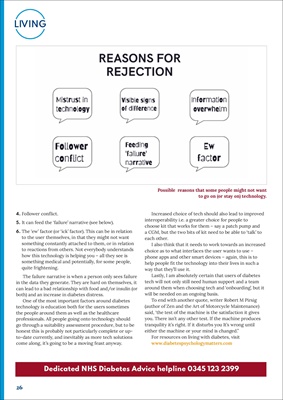
26
LIVING
4. Follower conflict.
5. It can feed the 'failure' narrative (see below).
6. The 'ew' factor (or 'ick' factor). This can be in relation
to the user themselves, in that they might not want
something constantly attached to them, or in relation
to reactions from others. Not everybody understands
how this technology is helping you - all they see is
something medical and potentially, for some people,
quite frightening.
The failure narrative is when a person only sees failure
in the data they generate. They are hard on themselves, it
can lead to a bad relationship with food and/or insulin (or
both) and an increase in diabetes distress.
One of the most important factors around diabetes
technology is education both for the users sometimes
the people around them as well as the healthcare
professionals. All people going onto technology should
go through a suitability assessment procedure, but to be
honest this is probably not particularly complete or upto-date
currently, and inevitably as more tech solutions
come along, it's going to be a moving feast anyway.
Increased choice of tech should also lead to improved
interoperability i.e. a greater choice for people to
choose kit that works for them - say a patch pump and
a CGM, but the two bits of kit need to be able to 'talk' to
each other.
I also think that it needs to work towards an increased
choice as to what interfaces the user wants to use -
phone apps and other smart devices - again, this is to
help people fit the technology into their lives in such a
way that they'll use it.
Lastly, I am absolutely certain that users of diabetes
tech will not only still need human support and a team
around them when choosing tech and 'onboarding', but it
will be needed on an ongoing basis.
To end with another quote, writer Robert M Pirsig
(author of Zen and the Art of Motorcycle Maintenance)
said, 'the test of the machine is the satisfaction it gives
you. There isn't any other test. If the machine produces
tranquility it's right. If it disturbs you I'ts wrong until
either the machine or your mind is changed."
For resources on living with diabetes, visit www.
diabetespsychologymatters.com
Caption here.
Dedicated NHS Diabetes Advice helpline 0345 123 2399